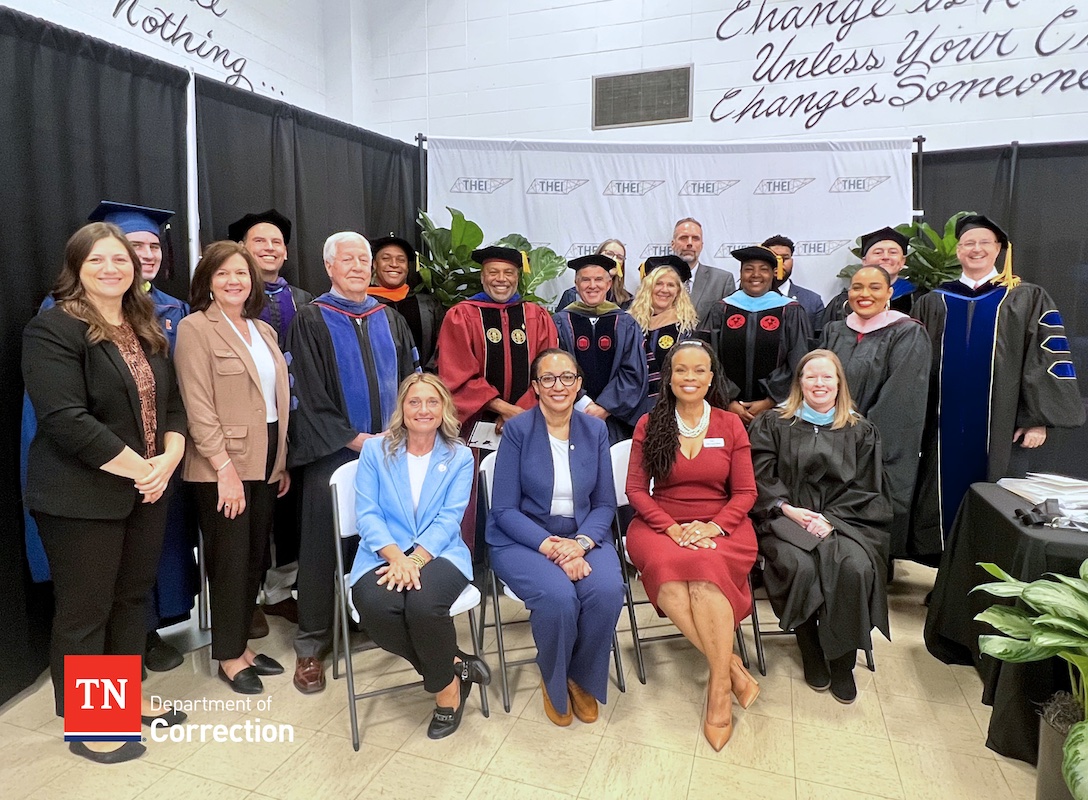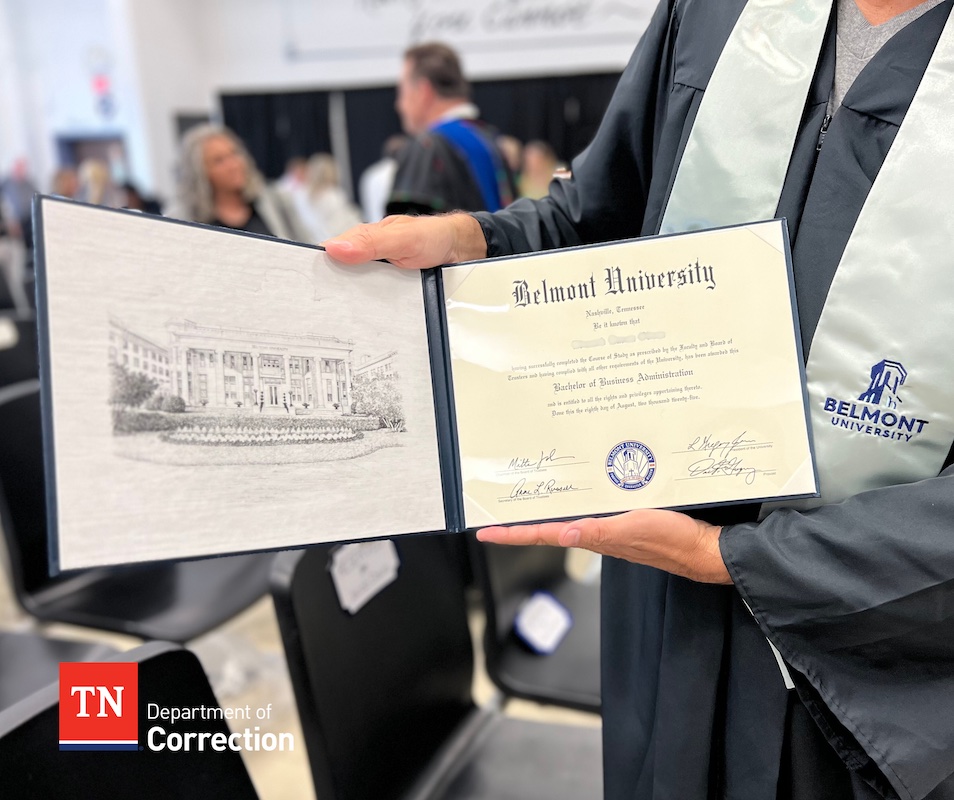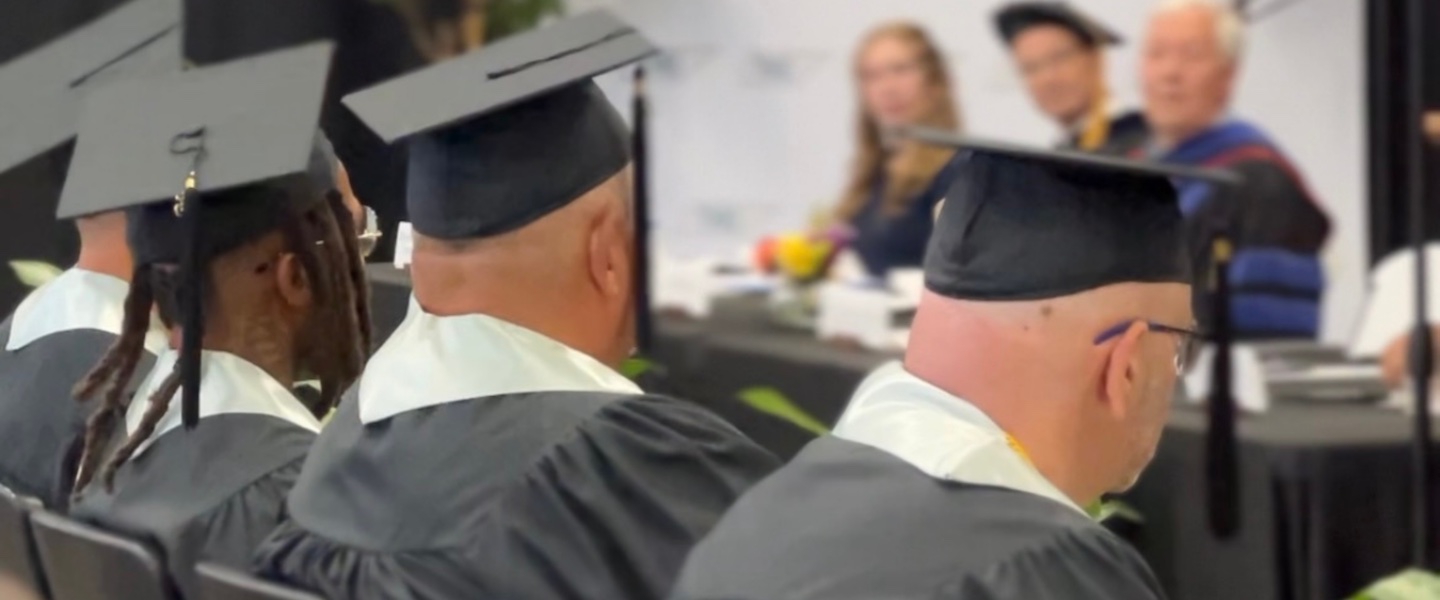Transformative access to education drives change for justice-impacted students
What began as a bold exploration to reimagine access to higher education has now become a transformative reality — one that is reshaping lives, restoring dignity and, as of Wednesday, Sept. 5, increasing the number of bachelor’s degree holders nationwide.
A collection of Belmont administrators, faculty and staff attended the graduation ceremony for nine graduates of Belmont’s Bachelor of Business Administration program who are currently incarcerated at the Turney Center Industrial Complex.
“The inaugural graduation at the Turney Center powerfully reflects Belmont University’s Christ-centered mission to offer hope and whole person formation through education,” said Dr. Jim McIntyre, dean of the College of Education and assistant provost for Academic Excellence. “Earning a bachelor’s degree deepens learning, opens doors, significantly reduces recidivism and enables graduates to contribute meaningfully to society. Simply put, education empowers, inspires and transforms. It was a joy to see the pride on the faces of our graduates, and particularly on the faces of their family members.”
Nine of ten graduates participated in the on-site commencement ceremony held inside the prison. Mike Stanfield is also an alumnus of the program who continued his studies after release and accepted his degree in May 2025. He was named the 2025 Heart of Belmont Award recipient, recognized for his persistence and character.
Building Year by Year

The milestone event has been years in the making. Tennessee Higher Education Initiative brings degree-bearing college programs to prisons in Tennessee. Belmont first partnered with the THEI to extend educational opportunities into correctional settings, guided by the belief that learning can spark hope and real change even in the most difficult circumstances.
Along with Belmont and the THEI team, a collection of champions in this work attended the graduation ceremony, including the Tennessee Department of Correction, representatives from Nashville State Community College, state legislators, representatives from the Office of the Governor and various foundations.
THEI Executive Director Laura Ferguson-Mimms has worked closely with Belmont on prison education at the Turney Center throughout the years.
"Higher education in prison is uniquely powerful because it doesn't just transform the individual sitting in the classroom — it radiates outward, touching everyone connected to that student,” Ferguson-Mimms said. “Our students repeatedly tell us that pursuing a degree while incarcerated creates hope that transfers throughout the facility, reaches their children and partners on the outside, and disrupts multi-generational cycles of harm.”
Belmont faculty and staff laid the groundwork by teaching and supporting justice-impacted students. The university delivered its rigorous academic coursework to students at the prison through a predominantly online, asynchronous mode.
In June 2023, Belmont strengthened its commitment when the program received accreditation from the Southern Association of Colleges and Schools Commission on Colleges (SACSCOC), recognizing the Turney Center as an official off-campus instructional site.
The fall graduation stands as the natural culmination of the program’s history — serving as a tangible outcome to underscore education’s transformative power.
“A Day You Will Never Forget”
“Graduates, you have made history with the work you have put into this program, into your education and into yourselves,” said Angela Dunbar, deputy commissioner of the Tennessee Department of Correction. “You have accomplished something extraordinary, and you have accomplished it under unique and challenging circumstances.”
Dunbar reminded the graduates that only 37% of people in the United States hold a bachelor’s degree. “Today,” she continued, “you become one of them.”
Education as a Distribution of Hope

Hope emerged as a central theme for the graduates. In his speech, David N., described the program as a lifeline against isolation.
“Often, the incarcerated are stigmatized by society as ‘less than’ or ‘other’ and discarded. This rejection can lead to feelings of loneliness and isolation, which in turn leads to hopelessness,” he said. “Where others saw broken pieces of clay, you all saw material fit for mo. We thank you all for seeing our humanity and giving us hope by reminding us we are not alone.”
For these graduates, education was not simply about academic credit. David remarked how “the program transformed us internally, which helps to create a better future externally.”
The Ripple Effect of Change
With recidivism rates of less than 1% among participants, THEI and Belmont have demonstrated that educational access inside correctional facilities can change life trajectories.
Earning a bachelor’s degree in prison is a tremendous accomplishment, but the program equips participants with something more impactful. The graduates are now positioned not only to continue their personal growth but also to lead, mentor and inspire others.
“That's what makes this work so powerful: it acknowledges that education is both a personal journey and a communal act of freedom,” Ferguson-Mimms said. “You're not fixing broken people; you're honoring the brilliance that was always there and giving it the tools to flourish.
Belmont currently has 29 students taking classes at the Turney Center. These students and recent graduates are living evidence of what can happen when hope, opportunity and support come together.
“These men are living examples of purpose and character in action,” McIntyre said. “Earning their degrees has not only transformed their futures — it’s transformed them. You can see it in the way they lead, encourage one another and bring hope to those around them. They are changing lives, starting with their own.”

